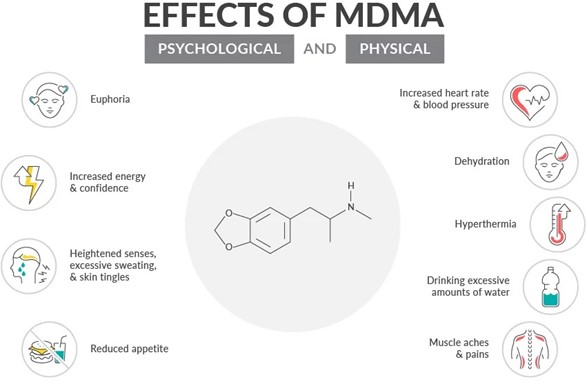A nurse in an urgent care clinic is caring for a client who reports recently using methylenedioxy-methamphetamine. Which of the following findings should the nurse expect?
Hypothermia
Somnolence
Hallucinations
Muscle weakness
The Correct Answer is C
MDMA, commonly known as ecstasy or Molly, is a stimulant drug that affects the central nervous system. It primarily acts on serotonin, dopamine, and norepinephrine neurotransmitters. The use of MDMA can lead to altered perception, increased sensory awareness, and hallucinations. Hallucinations may involve visual, auditory, or tactile sensations that are not based on reality.
The other findings mentioned—hypothermia (abnormally low body temperature), somnolence (excessive sleepiness), and muscle weakness—are not typically associated with MDMA use. Instead, MDMA use may lead to increased body temperature (hyperthermia), increased energy levels, agitation, increased heart rate, and muscle tension.

Nursing Test Bank
Naxlex Comprehensive Predictor Exams
Related Questions
Correct Answer is A
Explanation
The correct technique for using an albuterol MDI involves closing the mouth around the mouthpiece to create a seal. This helps ensure that the medication is delivered directly into the lungs and maximizes its effectiveness. It also helps prevent the medication from escaping and being wasted.
"Exhale immediately after inhaling": This instruction is not accurate. After closing the mouth around the mouthpiece and activating the inhaler to release the medication, the client should inhale slowly and deeply through the mouth, holding their breath for about 10 seconds if possible. Exhaling immediately after inhaling would not allow enough time for the medication to be absorbed effectively.
"Tilt your head forward while inhaling": Tilted head position is not necessary when using an albuterol MDI. The client should hold the inhaler in an upright position, with the mouthpiece directed toward their mouth. This allows for proper delivery of the medication.
"Take three quick breaths while depressing the canister": This instruction is not accurate for using an albuterol MDI. The correct technique involves taking a slow and deep breath in through the mouth, while simultaneously depressing the canister to release the medication. Taking three quick breaths may not allow enough time for adequate medication delivery.
Correct Answer is C
Explanation
Answer: C
Rationale:
A) Apply a topical corticosteroid ointment to the scalp: Corticosteroids are not indicated for the treatment of Pediculosis capitis (head lice). The treatment focuses on eliminating the lice and nits, typically through pediculicide medications like permethrin or ivermectin. Corticosteroids are used to reduce inflammation and itching, but they do not kill the lice or their eggs.
B) Soak hair brushes and combs in soapy water: Soaking hair brushes and combs in soapy water alone is not sufficient to kill lice. Items such as hair brushes should be soaked in hot water (130°F or higher) for at least 5-10 minutes to ensure any lice or nits present are killed. This is a critical step to prevent reinfestation.
C) Wash the bed linens in hot water: Washing bed linens in hot water (130°F or higher) is essential to eliminate lice and nits that may have transferred onto bedding. This prevents the spread and recurrence of lice. Items that cannot be washed should be sealed in a plastic bag for 2 weeks to kill the lice.
D) Clean the child's toys with a 1:10 bleach solution: Lice are spread through direct contact and cannot live on inanimate objects for long periods. Cleaning toys with bleach is unnecessary for lice removal and can be harmful to the toys or the child if not properly rinsed.

Whether you are a student looking to ace your exams or a practicing nurse seeking to enhance your expertise , our nursing education contents will empower you with the confidence and competence to make a difference in the lives of patients and become a respected leader in the healthcare field.
Visit Naxlex, invest in your future and unlock endless possibilities with our unparalleled nursing education contents today
Report Wrong Answer on the Current Question
Do you disagree with the answer? If yes, what is your expected answer? Explain.
Kindly be descriptive with the issue you are facing.
